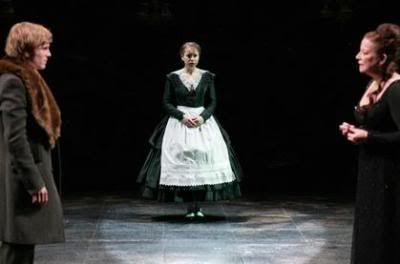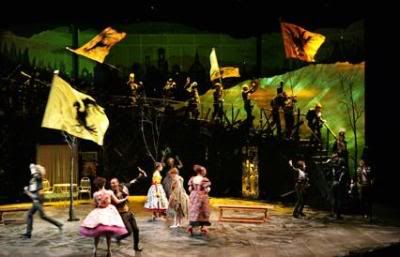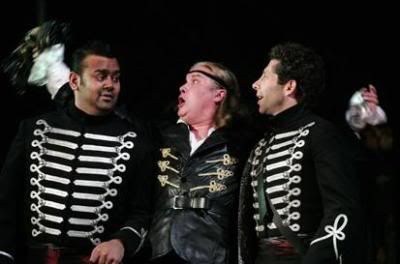
This production of one of Shakespeare's lesser known works under the direction of Marianne Elliott turns the fairytale 'happily ever after' ending on its head. The story centres on Helena, a lowly maid who serves the Countess of Rossillion whilst harbouring a secret love for her mistress' son, Bertram. In order to win Betram's affection, Helena is set a series of seemingly impossible tasks, which even if accomplished, will be no guarantee of his love. The odds seem stacked against our heroine from the start, but her resourcefulness, fortitude and spirit see her healing an ailing monarch, confronting class and generation divides and following her 'husband' to the frontline of battle.
The aesthetic of the piece has the feel of a gothic fairytale, further illustrating that in the world created on stage nothing is as it seems. It is to the credit of Rae Smith's stage design that the audience is seamlessly transported from the extravagance of the court of the King of France to the forests of Italy. Set and lighting are especially impressive, and the use of backscreen projection is both innovative and comic, particularly when Parolles (Conleth Hill) is pursued by a wolf into the forest. The return of the triumphant forces led by Betram to The Widow's refuge for pilgrims is also very well executed, as the scene moves from slow motion to normal speed, illuminating the actions of certain characters, and directing us to observe Helena's reaction to Bertram after being apart from him for so long.
Michelle Terry excels as Helena in this performance and presents the vulnerability and determination of her character with energy and pathos. Her diction is excellent and she seems to really understand the language she delivers, and is acutely aware of how the whole meaning of a line can be changed if she delivers it in a different way. George Rainsford is appropriately arrogant as Bertram, and his facial expressions upon discovering his bethrothal to Helena say more than words ever could. Conleth Hill is excellent as Parolles, as are Elliot Levey and Tony Jayawardena as the 1st and 2nd Lords Dumaine respectively, providing moments of laughter in a performance which although considered a comedy, has a wholly bittersweet conclusion as the fates of the newlyweds Bertram and Helena remain ambiguous to the audience.
(Photo credit: The National Theatre.)




